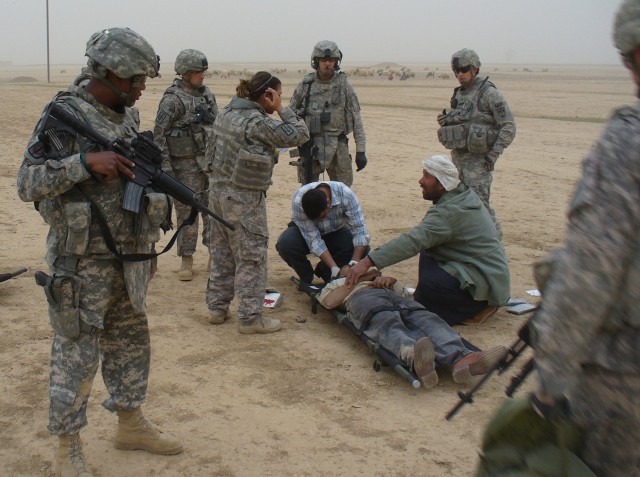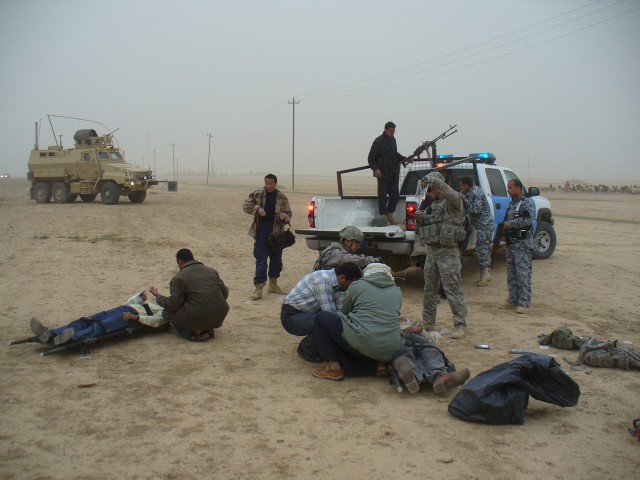A day like any other day for several Soldiers serving with the 607th Military Police Battalion, 8th MP Brigade, instantly halted, as local Iraqis and U.S. military Soldiers took action to assist Iraqi civillians in supplying emergency medical aid to two injured people at a moments notice.
A convoy of mine resistant ambush-protected vehicles (MRAP) carrying Soldiers with the 607th MP Btn. moved forward, toward Contingency Operating Base Speicher, closing out a mission in the area.
During the short trip home along Route Shane, near Tikrit, the convoy witnessed two vehicles violently collide nearby after another vehicle attempted to pass one of the colliding vehicles.
"They were passing another vehicle on the shoulder when they lost control, hit another vehicle and started rolling," said Sgt. John Meyer, a Robinson, Texas native and the lead truck commander for the mission, speaking of the vehicle which initiated the wreck.
"Two people were ejected after one car flipped two times," said Spc. Jennifer Overmeir, a Tampa, Fla. native and lead driver for the mission.
Overmeir alerted the others about the collision and the ejected passengers were quickly identified as Iraqi civilians.
Prior to dismounting, a secure perimeter was established and reinforced by Iraqi Police arriving at the scene minutes later.
Though no immediate threats were present at the site, the Soldiers of the 607th remained vigilant, maintaining the safety of themselves and the injured.
"At first there were no additional dangers, but the longer we sat there, the more we opened ourselves up to more dangers," said Meyer.
"The biggest danger from sitting in that one spot for a while was indirect fire," said Sgt. Joshua Stoops, a Colmesneil, Texas and rear driver for the mission. "Our security kept us safe while we did what we could to help the passengers.
" Placing the welfare of the injured above the danger which stopping their convoy posed upon themselves, the 607th MP "Gladiator" Soldiers chose to aid the victims of the collision.
"We called over the radio \'there's been a big accident, people have gotten ejected,' and we stopped the convoy," said Staff Sgt. Daniel Crouch, a Marshall, Mo. native and squad leader. "We all dismounted and went to provide medical aid to the litters."
"One of the passengers was awake and responsive, with an injury to his arm," Crouch said. "The other passenger was unconscious and had wounds to his head."
Utilizing the first aid resources on hand and their training for emergency situations, the Soldiers worked to stabilize and sustain the conditions of the injured until additional help arrived.
"When the guy wasn't responding to anything we did there was a sense of fear for me," Crouch said. "At the same time there was a feeling of helplessness, in that we didn't have the training, really, to deal with that level of injury. We did what we could to keep them as comfortable as possible."
In this case, help arrived in the form of good-Samaritans. A passing Iraqi doctor stopped at the site of the incident to lead in the medical care of the injured.
"There was a doctor who stopped and he talked to our linguist and identified himself as a doctor and he helped put on the splints," Overmeir said.
A Sheppard who witnessed the incident also was fast to respond and offer his assistance in the care of the injured.
"He kept talking to the passengers and kept them talking," said Meyer, speaking of the assistance which the sheppard provided. "One of the injured wanted to take the bandages off but the Sheppard kept telling him not to."
With the help of the Iraqi doctor, the Iraqi Police and the 607th MP "Gladiators," the injured were stabilized and taken to a nearby hospital for further treatment.
"We bandaged up what we could and one of the civilians went and called the IPs. They came back, we loaded them up on a truck and took them to a hospital," said Meyer.
According to Lt. Col. Efrain Delacruz, the 607th MP Btn. commander, the Iraqi civilian who sought out the help of the IP was the driver who may have been responsible for the collision of the two vehicles.
The responsibility of the Iraqi driver who sought aid for the injured Iraqis, for Delacruz, was the most admirable aspect of the incident.
"Some of the onlookers thought he wouldn't come back; They thought he was fleeing the scene," Delacruz said. "But he did come back and he brought help."
"He went 15-20 miles down the road and brought the IPs back," said Delacruz.
Beyond the emotions of the situation, the reactions to a real-life rescue and aid situation of his Soldiers impressed Crouch.
"We were all anxious in that situation, but looking back on it, seeing how everyone reacted, there is a certain level of calmness," Crouch said. "Nobody was panicking, everyone knew what to do."
In the days following the incident, the command of the 607th MP "Gladiators" placed calls routinely, with an interest in the recovery of the injured passengers, according to Delacruz.
"We have spoken with the doctor and the injured Iraqis," said Delacruz. "The doc assured me they were okay and they thanked us for our help. They're home and recovering now."
Attributing the actions of the team to training and instincts, Maulden believes the teamwork and heroic strides of the "Gladiator" Soldiers on that day was a part of their jobs as military policemen and Soldiers.
"Part of our job is the 'police' aspect of 'military police,'" said Spc. Matthew Maulden, a Witchita, Texas native and the lead gunner for the mission. "We're first responders back in the states. We're trained to do it, we're going to do it."
For Delacruz, the heroes of the incident were not the "Gladiator" Soldiers, but the many Iraqi citizens who lent their efforts to those in need.
"We couldn't do much for the injured, except keep them stabilized," said Delacruz. "It was the Iraqi people: the Iraqi doctor, the Sheppard, the driver and the IPs that were to thank. It shows that the Iraqi people know they can trust the IPs to be there for them."




Social Sharing